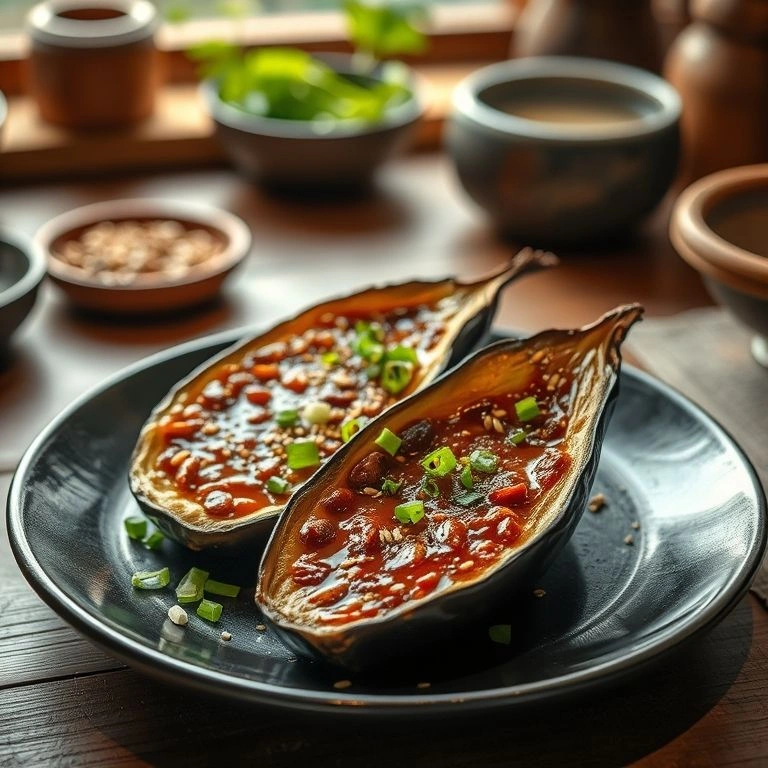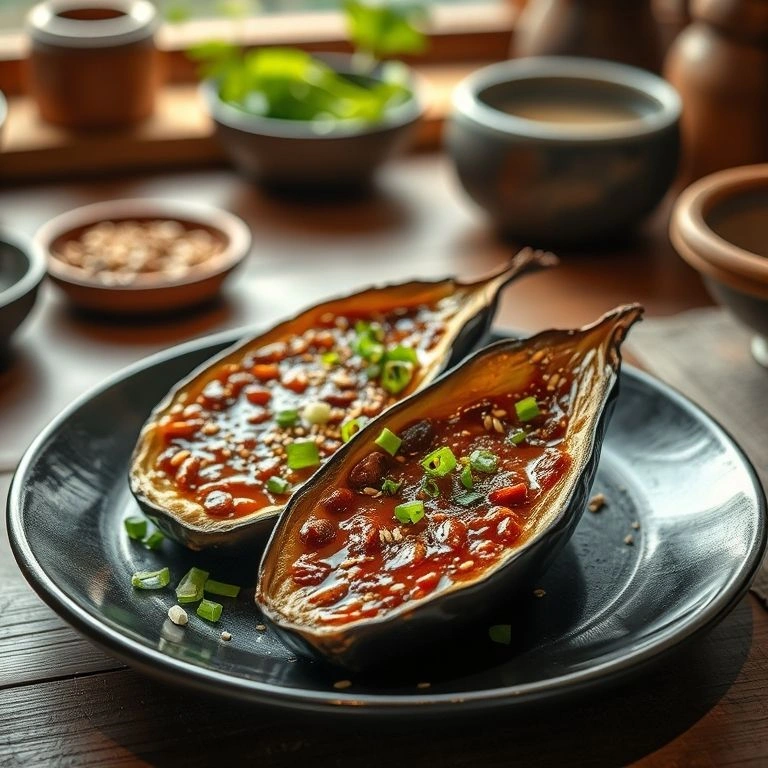Introduction
Have you ever tasted the delectable Japanese dish called Nasu Dengaku and wondered if you could recreate that magic at home? Well, today is your lucky day! I’m sharing the absolute best Nasu Dengaku recipe that will transport your taste buds straight to Japan. This traditional Japanese eggplant dish, glazed with sweet and savory miso, is not only incredibly delicious but also surprisingly simple to make. Furthermore, once you master this Nasu Dengaku recipe, you’ll find yourself making it regularly as a crowd-pleasing appetizer or a satisfying side dish.
What is Nasu Dengaku?
Nasu Dengaku (茄子田楽) translates to “eggplant grilled over a fire” and has been enjoyed in Japan for centuries. Traditionally, this dish consists of eggplants that are first grilled or broiled, then topped with a sweet miso glaze and briefly cooked again. The result is a mouthwatering combination of creamy eggplant and caramelized miso that creates an umami explosion in your mouth. Additionally, this vegetarian delight showcases the Japanese talent for transforming simple ingredients into extraordinary culinary experiences.
Why This Nasu Dengaku Recipe Stands Out
What makes this particular Nasu Dengaku recipe exceptional? First of all, I’ve perfected the cooking technique to ensure your eggplant achieves that perfect tender texture without becoming mushy. Secondly, the miso glaze has been carefully balanced to create the ideal harmony between sweet and savory flavors. Moreover, I’ve included some modern twists while still honoring the traditional preparation methods. Consequently, you’ll create a dish that’s both authentic and accessible for home cooks.
Ingredients You’ll Need
Before diving into the cooking process, let’s gather all the necessary ingredients for this outstanding Nasu Dengaku recipe:
- 4 Japanese eggplants (or 2 medium regular eggplants)
- 2 tablespoons vegetable oil
- 3 tablespoons white miso paste
- 2 tablespoons mirin
- 1 tablespoon sake (or dry white wine)
- 1 tablespoon sugar
- 1 teaspoon sesame oil
- 1 tablespoon toasted sesame seeds
- 2 green onions, thinly sliced
- Salt to taste
As a result of using these quality ingredients, your Nasu Dengaku will develop complex flavors that make this dish truly special.
Step-by-Step Instructions
Preparing the Eggplant
- First, preheat your oven to 425°F (220°C).
- Meanwhile, wash the eggplants thoroughly and pat them dry.
- Next, cut the eggplants in half lengthwise.
- Subsequently, score the flesh in a diagonal pattern, being careful not to cut through the skin.
- After that, sprinkle a little salt over the cut surfaces and let them sit for 10 minutes to draw out bitterness.
- Then, pat the eggplants dry with paper towels.

Making the Miso Glaze
- In a small bowl, combine the white miso paste, mirin, sake, sugar, and sesame oil.
- Whisk these ingredients together until smooth and well incorporated.
- Taste the mixture and adjust seasonings if needed.

Cooking the Nasu Dengaku
- Brush the cut surfaces of the eggplants with vegetable oil.
- Place them cut-side down on a baking sheet lined with parchment paper.
- Roast for about 15-20 minutes, or until the eggplants are tender when pierced with a fork.
- After that, remove the eggplants from the oven and flip them cut-side up.
- Switch your oven to broil setting.
- Generously spread the miso glaze over the cut surfaces of the eggplants.
- Consequently, return them to the oven and broil for 3-4 minutes until the glaze bubbles and begins to caramelize. Watch carefully to prevent burning!

Serving Your Nasu Dengaku
- Remove the eggplants from the oven and transfer to a serving plate.
- Immediately sprinkle with toasted sesame seeds and green onions.
- Therefore, serve while still hot for the best flavor experience.

Tips for Perfecting Your Nasu Dengaku Recipe
To ensure your Nasu Dengaku turns out perfectly every time, consider these helpful tips:
- Choose the right eggplants: Japanese eggplants are ideal for this recipe because they’re less bitter and have thinner skin. However, regular eggplants work well too.
- Don’t skip the salting step: This helps remove bitterness and excess moisture, resulting in a creamier texture.
- Watch the broiling carefully: The miso glaze can burn quickly due to its sugar content. Therefore, keep a close eye on it during the final broiling step.
- Experiment with miso varieties: While white miso creates a milder, sweeter glaze, you can try red or mixed miso for a stronger, more complex flavor.
- Make ahead option: You can prepare the eggplant and miso glaze separately ahead of time, then assemble and broil just before serving.
Variations to Try
Once you’ve mastered the basic Nasu Dengaku recipe, you might want to try these delicious variations:
- Spicy version: Add a teaspoon of sriracha or gochujang to the miso glaze for a spicy kick.
- Garlic lover’s option: Include a clove of minced garlic in your miso mixture for extra depth.
- Protein-packed: Top your finished Nasu Dengaku with crumbled tofu or a soft-boiled egg.
- Herb-infused: Finish with fresh herbs like shiso, cilantro, or Thai basil for a fragrant twist.
Pairing Suggestions
This Nasu Dengaku recipe works wonderfully as part of a larger Japanese meal. Consider serving it alongside:
- Steamed white rice
- Miso soup
- Grilled fish or chicken yakitori
- Cucumber sunomono salad
- Cold soba noodles in summer
Additionally, it pairs beautifully with a cold Japanese beer, sake, or green tea.
Health Benefits
Not only is this Nasu Dengaku recipe delicious, but it’s also nutritious! Eggplant is low in calories yet high in fiber and antioxidants. Furthermore, miso provides beneficial probiotics and protein. As a result, you can enjoy this flavorful dish while nourishing your body.
Conclusion
This Nasu Dengaku recipe brings together the perfect balance of traditional technique and accessible preparation, allowing you to create a restaurant-quality Japanese delicacy in your own kitchen. The contrast between the creamy, tender eggplant and the sweet-savory miso glaze creates an unforgettable flavor experience that will have everyone asking for seconds. Therefore, don’t hesitate to add this impressive yet simple dish to your cooking repertoire.
Finally, remember that cooking is about enjoyment and personal taste. Feel free to adjust this Nasu Dengaku recipe to suit your preferences—that’s how great cooks develop their signature dishes! Consequently, I hope you’ll give this recipe a try soon and discover why Nasu Dengaku has been beloved in Japan for generations.

Best Nasu Dengaku Recipe You’ll Ever Make at Home
Description
Discover the irresistible charm of Nasu Dengaku, a traditional Japanese dish where tender eggplant meets a caramelized sweet-salty miso glaze. Simple to prepare yet packed with umami, this classic delicacy delivers creamy texture and bold flavor in every bite. Perfect as an appetizer or side, Nasu Dengaku captures the essence of Japanese cooking—transforming humble ingredients into an unforgettable dining experience.
Ingredients:
Instructions
Preheat oven to 425°F (220°C).
Cut eggplants in half lengthwise and score the flesh diagonally.
Salt the cut surfaces and let sit for 10 minutes, then pat dry.
Combine miso paste, mirin, sake, sugar, and sesame oil in a bowl.
Brush eggplants with vegetable oil and place cut-side down on a lined baking sheet.
Roast for 15-20 minutes until tender.
Remove from oven, flip cut-side up, and switch oven to broil.
Spread miso glaze on eggplants and broil for 3-4 minutes until bubbly.
Garnish with sesame seeds and green onions before serving.
Nutrition Facts
Servings 4
- Amount Per Serving
- Calories 120kcal
- % Daily Value *
- Total Fat 7g11%
- Sodium 450mg19%
- Total Carbohydrate 15g5%
- Dietary Fiber 4g16%
- Protein 3g6%
* Percent Daily Values are based on a 2,000 calorie diet. Your daily value may be higher or lower depending on your calorie needs.






